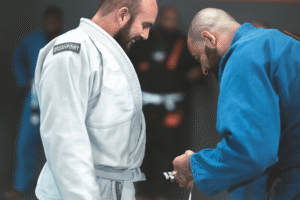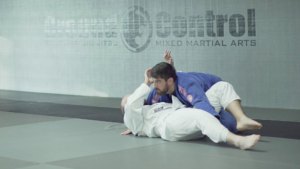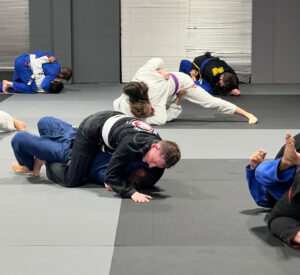
From White Belt to Black Belt: How to Stay in the Game Long-Term
Let’s face it, starting Brazilian Jiu-Jitsu is exciting. Every class feels like unlocking a new superpower. However, as time passes, that initial rush begins to
At Ground Control Columbia, our advanced athletes know the real battles don’t always happen in submissions—they happen when you’re fighting to keep your guard alive. Retaining guard against high-level pressure passers is one of the most technical and exhausting challenges in BJJ. But with the right strategy and mindset, you can build a guard that’s nearly impossible to break.
Guard recovery at the advanced level is more like flowing through a system than hitting one magic reset. Your ability to shift from frames to knee shield to a seated guard—or to invert, pummel, and re-guard—is what keeps you alive under pressure.
At Ground Control Columbia, we stress the importance of chaining techniques. You’re not just surviving—you’re baiting passes, creating angles, and re-entering offensive positions. Treat your guard recovery like a submission flow: repeat it, drill it, and make it second nature.


Every strong recovery begins with solid framing. Think of your arms, hands, shins, and even feet as the scaffolding that supports your guard. If those frames collapse, the pass is coming fast.
Your job is to use active frames—not static ones—to redirect pressure, manage distance, and create angles. A shoulder frame, a cross-collar post, or a stiff-arm can completely reset the tempo of a roll. Our Columbia coaches emphasize learning to adjust frames mid-movement instead of clinging to a single “safe” spot.
Angles are everything. If you’re flat on your back, you’ve already given up the advantage. High-level guard recovery relies on constant hip movement and positioning. Whether it’s shrimping out, rotating to face your opponent, or pivoting for a hook, your angles create openings and restore control.
This is especially important against pressure passers or float-style guard passers who rely on timing. Adjust your hips before you get flattened, and you’ll stay a step ahead of the pass.
Advanced guard recovery is about composure. The more relaxed and aware you are, the better your reaction time and decision-making. That’s why we stress situational drilling and recovery reps under live pressure. You have to learn to breathe and stay composed—even when someone’s trying to smash your guard for the fifth time in a round.
Keep your breathing steady, your mind clear, and your movements deliberate. No panic. No wasted energy. Just confident control.
At this level, you should already be building your “go-to” guard recovery chains. Some solid ones we see at Ground Control Columbia:
Knee Shield ➝ Reverse DLR ➝ Full Guard Recovery
Inversion ➝ Leg Pummel ➝ Ashi Garami Entry
Granby ➝ Turtle ➝ Sit-Up Guard Transition
The goal is to flow from compromised to controlled—not necessarily back to perfect guard, but into a position where you can attack, sweep, or reset. Don’t just drill these sequences in isolation—train them under pressure. Start from bad spots in positional sparring. Have a teammate begin mid-pass and challenge yourself to work your chain before they secure side control.
Rolling hard is fun, but smart reps under pressure are what sharpen your recovery instincts. Film your rolls. Start in bad positions. Ask coaches what you’re missing. We encourage Columbia athletes to train recovery the same way they train submissions—with reps, feedback, and analysis.
And remember—other disciplines can complement your guard too. Wrestling improves your scrambling. Striking footwork sharpens your balance and mobility. Ground Control Columbia is all about cross-training for complete martial artists.
The better your guard retention, the more confident and dangerous you become. Instead of playing not to lose, you start dictating the match—even from your back.
At Ground Control Columbia, we train our athletes to treat guard like a weapon, not just a shield. If you want to level up your defense and make your guard feel untouchable, we’ll show you how to build it—one recovery at a time.

Let’s face it, starting Brazilian Jiu-Jitsu is exciting. Every class feels like unlocking a new superpower. However, as time passes, that initial rush begins to

You’ve put in the hours on the mats—drilling, rolling, building a solid ground game—and now you’re thinking about stepping into something more intense: MMA. It’s

Every dedicated Brazilian Jiu-Jitsu practitioner will, at some point, experience a plateau. It’s that tough phase where progress feels stagnant, your go-to techniques aren’t landing
© All Rights Reserved. Ground Control Columbia